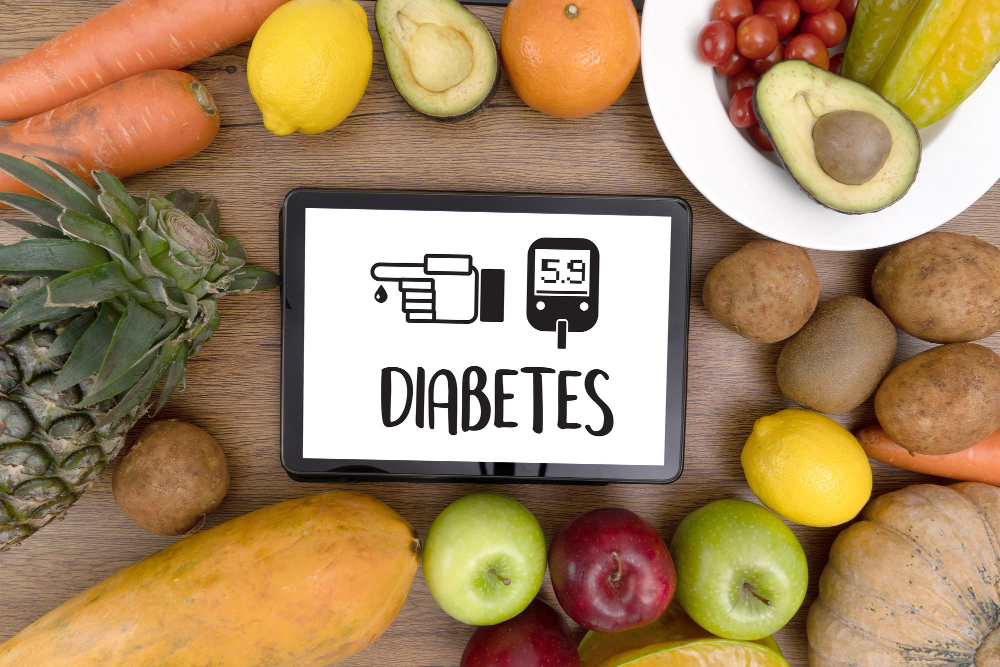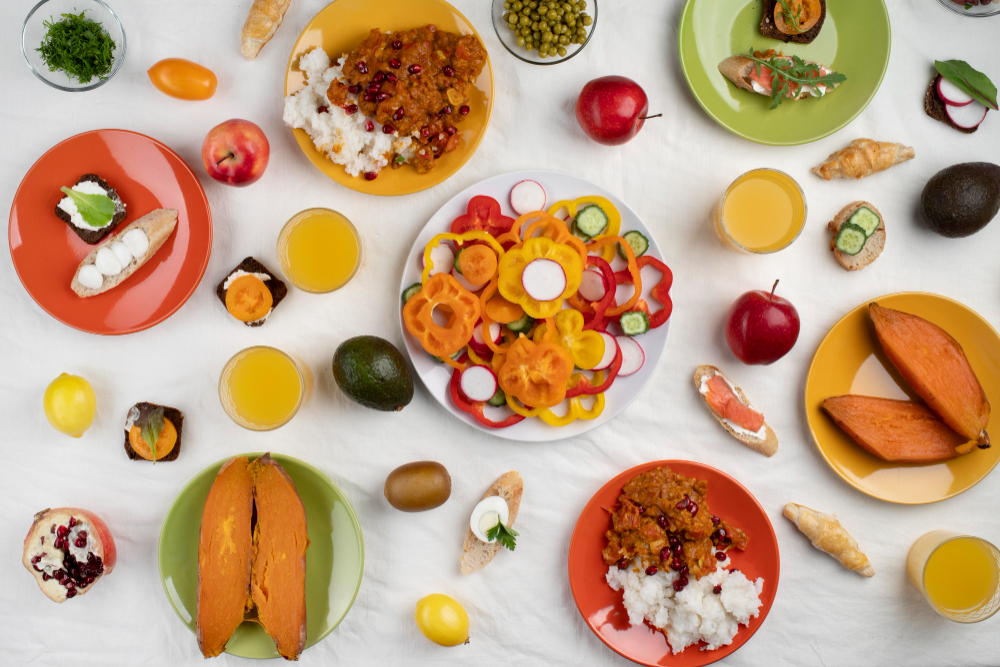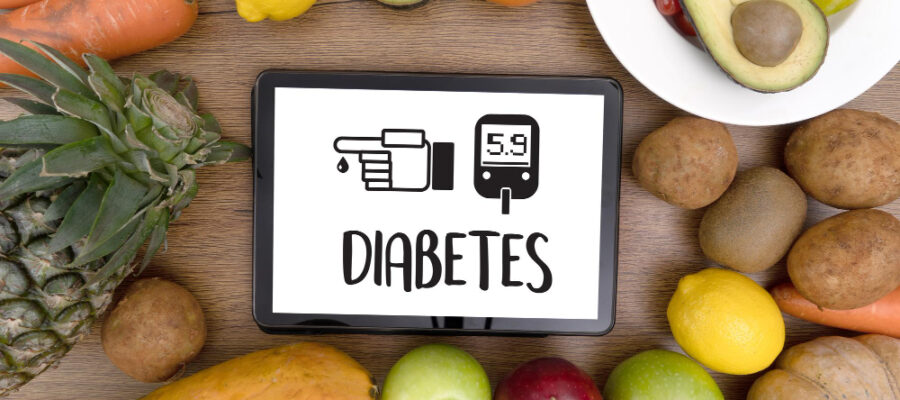If you have diabetes, you need to see your doctor and dietitian for the right health advice and dietary planning. A diabetic diet for regaining health need not be monotonous and bland. You can make it very interesting while training your taste buds to enjoy natural tastes well. Discover four essential food types that can help manage blood sugar levels effectively for diabetics. While these tips are generally beneficial, always consult your doctor and dietitian to tailor your diet to your needs. Knowing what to eat and what to avoid is crucial in diabetes management. Let’s explore the foods that can make a difference in your health journey!
Foods that Help Plan a Healthy Diabetic Diet

1. Fiber-rich Foods: Healthy Carbs
All carbs impact blood glucose, so it’s crucial to know which foods help avoid blood sugar spikes and fluctuations. Turns out that fiber-rich foods help in gradual glucose release into the bloodstream instead of giving sugar spikes, after you consume them. Opt for healthier carb sources and watch portion sizes. Fiber-rich foods help regulate digestion and control blood sugar levels. Fiber includes all parts of plant foods that your body can’t digest or absorb, aiding in blood sugar management. Foods high in fiber include:
Vegetables
- Okra
- Bottle Gourd
- Bitter Gourd
- Ash Gourd
- Raw Banana
- Cluster Beans
- Capsicum
- Radish
- Zucchini
- Carrots
- Broccoli
- Cabbage
- Spinach
- Tomatoes
- Cucumber
- Lettuce
Millets
- Sorghum
- Finger millet
- Foxtail
- Barnyard
- Pearl millets
Fruits
- Apple
- Guava
- Orange
- Papaya
- Melons
Nuts
- Almonds
- Walnuts
- Cashews
- Pistachios
- Peanuts.
Pulses
- Chickpeas
- Beans
- Lentils
Legumes
- Beans
- Peas
Whole grains
- Brown rice
- Buckwheat
- Whole oats
#Tip: Cut down on low-fiber foods
Cutting down on low-fiber foods like white bread, white rice, and highly processed cereals is crucial. To find high-fiber options, check food labels. Making these changes can significantly improve your diet and overall health.
More Insight Into Including Fibre-rich Foods in Your Diet
Whole Grains
Include whole grains in your diabetic diet for stable blood sugar levels. Opt for chapati for fiber, brown rice for vitamins and minerals, quinoa for protein, and millet for its gluten-free, nutrient-rich benefits. Incorporating these grains ensures a balanced and nutritious approach to managing diabetes.
Vegetables
Boost your diabetic diet with a variety of vegetables for optimal health and blood sugar control. Nutrient-packed options like spinach, kale, cauliflower, bell peppers, and bitter gourd are low in calories and carbs but rich in vitamins, minerals, and fiber. These veggies aid digestion, stabilize blood sugar levels, and offer essential nutrients for overall well-being.
Fruits
Enhance your diabetic diet with a variety of fruits for sweetness without blood sugar spikes. Enjoy berries for fiber and antioxidants, apples for soluble fiber, oranges for vitamin C and hydration, and guava for fiber and essential nutrients. These fruits help stabilize blood sugar levels and boost overall health.
Why Should You Eat More Fruit and Veg?
We all know that eating fruits and vegetables is great for your health. Aim to include more of them in your meals and enjoy them as snacks when you’re hungry. Doing so ensures you get the essential vitamins, minerals, and fiber your body needs daily. This not only helps keep you healthy but also supports your overall well-being. Embrace the natural goodness of fruits and veggies for a nutritious boost throughout your day.
Munch On
You might be wondering if you should avoid fruit because it’s sugary. The answer is no—whole fruit is beneficial for everyone, including those with diabetes. While fruits do contain sugar, it’s natural sugar, which is different from the added sugars found in sweets like chocolate, biscuits, and cakes. Natural sugars in fruits come with fiber, vitamins, and minerals that are essential for your health. So, don’t shy away from fruits; they provide a nutritious and healthy way to satisfy your sweet cravings while supporting your overall well-being.
#Tip: Opt for whole fruit over fruit juices, which count as added sugar.
Choose fresh, frozen, dried, or tinned fruit (in juice, not syrup) for the best benefits. Spread your fruit intake throughout the day rather than eating a large portion at once.
Incorporating these fruits into a vegetarian diabetic diet helps manage blood sugar levels effectively while allowing you to enjoy a variety of delicious and nutritious meals. With the right choices, you can maintain a healthy, balanced diet that supports your overall well-being and keeps your blood sugar stable.

2. Protein-Rich Healthy Foods
Incorporate a variety of protein sources into your diabetic diet plan for stable blood sugar levels and overall health. Opt for nutrient-rich options like tofu, lentils, and beans, which provide essential proteins and fibers that help regulate blood sugar effectively. Tofu is a versatile plant-based protein that can be used in numerous dishes, while lentils and beans are not only high in protein and fiber but also packed with vitamins and minerals. Including these diverse protein sources in your meals supports blood sugar management and contributes to a balanced, nutritious diet that promotes overall well-being.
3. Healthy Fats
Enhance your diabetic diet with healthy fats for heart health and overall well-being. Incorporate nutrient-rich options like avocado, unsalted nuts, seeds, oily fish, olive oil, rapeseed oil, and sunflower oil. and peanut oils. These foods are rich in monounsaturated fats and antioxidants, which not only support improved insulin sensitivity but also help reduce inflammation in the body. The monounsaturated and polyunsaturated fats help lower LDL or low-density lipids (bad cholesterol).
Healthify your meals with healthy fats for nutrition and balance, boosting overall health and well-being. Just remember, moderation is key, as fats are calorie-dense. It may be noted here that ghee and butter, though rich in saturated fats can still be good for your health. These foods help line your blood vessels, internal organs and and lower inflammation. Ghee can be particularly good for brain health. That’s why, including ghee (from desi cow and buffalo) in your diet is good for health and overall, helps mobilize toxins out of the body. When consumed correctly, ghee may even help weight reduction and improve vital organ health.
#Tip: Go for Heart-Healthy Omega-3-rich foods.
Consume heart-healthy fish twice weekly, like salmon, mackerel, tuna, and sardines, rich in omega-3s to prevent heart disease. Avoid fried fish and high-mercury types like cod. Incorporate roasted flaxseed daily for essential omega-3s.
#Tip: Your body needs healthy fats, not the chemically-processed junk
Steer clear of unhealthy foods packed with saturated fats, as they can raise cholesterol levels and heighten the risk of heart issues. These fats lurk in animal products and processed foods like red meat, margarine, lard, and baked goods. Opt for healthier cooking methods like grilling, steaming, or baking to minimize oil usage and promote heart health.
#Tip: Plan your diet to get minerals and vitamins
While supplements may not aid in managing diabetes, certain exceptions, like folic acid during pregnancy, are necessary. Generally, opt for a diverse diet to obtain vital nutrients. Beware: some supplements may interact with medications or worsen diabetes complications, such as kidney disease.
4. Healthy & Fresh Dairy
For individuals with diabetes, incorporating healthy dairy options like unsweetened yogurt and milk into their diet is crucial. These dairy products are rich in essential nutrients such as calcium, protein, and vitamin D, which are important for bone health and overall well-being. Unsweetened yogurt provides probiotics that support gut health and may improve insulin sensitivity. Milk, particularly low-fat or skim varieties, offers these benefits without added sugars that can spike blood glucose levels.
By choosing these dairy options, individuals with diabetes can enjoy nutritious, satisfying foods that contribute to better blood sugar control and improved overall health.
Foods to Avoid in a Diabetic Diet
Refined Grains
If you have diabetes, steer clear of refined grains such as white rice, white bread, and processed flour products. These foods can lead to rapid spikes in blood sugar levels, disrupting your management efforts. Instead, opt for whole grains like brown rice, whole wheat bread, quinoa, and oats. Whole grains offer better blood sugar regulation, provide essential nutrients, and promote improved overall health. By making this simple swap, you can enjoy steadier blood sugar levels and a healthier diet that supports your diabetes management.
Sugary Foods
Stay away from sugary foods like pastries, candies, carbonated drinks, and sweetened snacks. These items can cause rapid spikes in blood sugar levels, increasing the risk of complications. Instead, choose healthier alternatives such as fresh fruits, unsweetened yogurt, or nuts to satisfy your cravings. These options not only help manage blood sugar more effectively but also provide essential nutrients that support overall health. By making mindful choices, you can enjoy delicious treats while keeping your diabetes under control.
Tips to Cut Down on Free Sugar
1. Start with Small Swaps:
- Replace sugary drinks, energy drinks, and fruit juices with water, plain milk, or unsweetened tea and coffee. This simple change can significantly reduce your sugar intake.
2. Think of How It Helps:
- Managing Blood Glucose: Cutting out free sugars helps regulate blood glucose levels, essential for managing diabetes.
- Weight Control: Reducing sugar intake aids in weight management. Low or zero-calorie sweeteners can be a temporary substitute (sometimes, they are even unhealthy) but aim to reduce overall sweetness in your diet for long-term benefits.
3. Choose Healthier Alternatives:
- Opt for fresh fruits instead of sugary snacks. They provide natural sweetness and essential nutrients without the spike in blood sugar levels.
4. Read Labels:
- Check food labels for hidden sugars in packaged foods. Being aware of ingredients helps you make better choices.
5. Gradual Reduction:
- Go for organic sugar in foods, first. And gradually reduce the amount of sugar in recipes and foods. Your taste buds will adjust over time, making it easier to enjoy foods with less sugar.
By implementing these practical tips, you can effectively cut down on free sugar, leading to better blood sugar control and improved overall health.
High-Fat Dairy
Limiting high-fat dairy products like full-fat milk, cheese, and cream is essential in a diabetic diet due to its saturated fat content, which can increase heart disease risk. Opt for low-fat or fat-free alternatives to support heart health and manage blood sugar levels effectively. Plant-based options like almond or soy milk can also be beneficial.
Fried Foods
Avoid fried foods like samosas, french fries, and deep-fried snacks in a diabetic diet. These items are high in unhealthy fats and calories, which can lead to weight gain and insulin resistance, complicating diabetes management. Instead, choose healthier cooking methods such as baking, grilling, or steaming. These alternatives help reduce fat intake and support better blood sugar control, allowing you to enjoy delicious meals while maintaining your health. Embrace these healthier options for a balanced, nutritious diet that aids in diabetes management and overall well-being.
Excessive Salt
Eating lots of salt can raise your risk of high blood pressure, heart disease, and stroke. With diabetes, these risks are even higher. Limit your salt intake to a maximum of 6g (one teaspoon) per day. Many pre-packaged foods contain hidden salt, so check labels and choose low-salt options. Cooking from scratch helps control your salt intake. Reduce foods high in salt like pickles, processed meats, and canned soups. Instead, opt for fresh foods and season with herbs and spices for better blood sugar control and overall health.
Avoid Red and Processed Meat
Cutting down on carbs might lead you to eat more meat for fullness. However, increasing portions of red and processed meats like ham, bacon, sausages, beef, and lamb is not advisable due to their links to heart problems and cancers.
Instead, try these healthier alternatives:
- Pulses such as beans and lentils
- Eggs
- Heart-healthy fish
- Unsalted nuts
Beans, peas, and lentils are high in fiber and have minimal impact on blood glucose levels, making them excellent substitutes for processed and red meats while keeping you satisfied. Fish, especially oily varieties like salmon and mackerel, are rich in omega-3 oils, which protect your heart. Aim to include two portions of oily fish in your diet each week for optimal health.
Alcohol: Cut It Away from Your Life
Alcohol is packed with calories, making it harder to lose weight. If you drink, try to limit your intake to a maximum of 14 units per week, spread out to avoid binge drinking, and ensure several alcohol-free days each week.
For those taking insulin or other diabetes medications, drinking on an empty stomach is risky as it increases the likelihood of hypoglycemia (hypos). Cutting back on alcohol not only aids weight loss but also helps maintain stable blood sugar levels and improves overall well-being. Embrace a healthier lifestyle by reducing or eliminating alcohol from your routine.
Concluding Words
With careful meal planning and adherence to a balanced diet, individuals with diabetes can lead a fulfilling and healthy life. It’s essential to consult with a healthcare professional or dietitian, especially those offering nutrition diet services, before making any substantial changes to your diet.
Additionally, it is worthwhile to mention loving yourself and self-care is very important. Practicing meditation to understand yourself inside out gives us the capability to accept everyone as they are and have compassion and love in our hearts. These practices are the real diet of our mind that can keep us all full of energy and healthy.
A simple lifestyle and rich intellect will ward off so many diseases and bring health. This is because when you have been a source of joy and wellness to others, the same will come back to you manifold in time. So, learn to plan your diabetic diet, smile more, do good, and don’t forget to pray and thank the Almighty before you eat your morsel.
Disclaimer: This article and its contents are provided for educational and informational purposes only and do not constitute medical advice or professional services specific to you or your medical condition.
